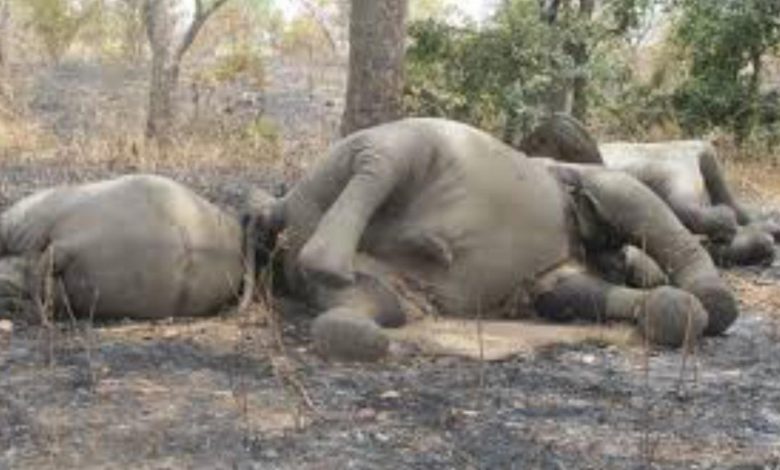As Government Defaults On Farmers’ Compensation, Elephants In Cameroon’s Park Are Threatened

In January, 2012, reports emerged in the international media and by wildlife protection organisations that 400 elephants were slaughtered in Bouba Ndjida National Park sin Northern Cameroon.
Although the Cameroonian government instituted its own investigation and came out with a report that only 128 elephants were actually killed by poachers, government did not, to date, seem to have learnt their lesson to put into place viable measures to forestall any further such mass slaughters.
When the slaughters were reported, President Paul Biya who was then holidaying in Geneva, Switzerland, instructed the then Minister of Defence, Edgar Alain Meme Ngo’o, then Minister of Forestry and Wildlife, Ngole Ngwese, local administrative officials in the North Region as well as security and defence operatives to take the necessary measures to prevent any such mass killings of elephants which are a protected specie.
A meeting by the ministers and security officials was held in the North Regional main town of Garoua during which it was decided to beef up security and vigilance measures by assigning soldiers and policemen to accompany the poorly equipped eco-guards who currently patrol the park.
Perhaps as a measure to dissuade the local populations from collaborating with poachers, government decided to effectively distribute part of the money raised by way of taxes from the park to the populations in which area the park was carved.
This has been the bone of contention by the local populations who insist they must be compensated for their land which was appropriated to create the park and for their farmlands destroyed by marauding elephants.
Government has not fulfilled its promise and the protection given to the elephants has led to increase in their numbers and proliferation in the destruction of farmlands. As a result, the people often collaborate and cheer poachers whenever they arrive to hunt down the animals.
Since the decision to pay some compensation to farmers and indigenes of the area where the Bouba Ndjida National Park is situated from revenue derived from professional hunting and tourism activities in the park, not much seems to have been done to effectively implement the decision.
“Did I hear you say farmers whose farms and farmlands were destroyed by elephants were supposed to be compensated? Well, that is big news to me. And to think that the decision was taken about eight years ago and some of us regularly affected are yet to see a franc!
“Nothing surprises one anymore about the behaviour of functionaries of this government,” a farmer, Aliyu Moussa, told HumAngle in Vaimba, a village situated in the Bouba Ndjida National Park.
“I am almost completely ruined today because as a farmer, I relied on my farm for sustenance but since elephants destroyed my crops two years ago, I am yet to find my feet. Of course, I have received nothing by way of compensation from government,” another farmer who refused to give his name, said.
Officials of the Ministry of Forestry and Wildlife in Garoua have been tight-lipped and all efforts by HumAngle to get them talk on allegations that money budgeted for the compensation of farmers whose crops were destroyed in the park area has been embezzled have been futile.
“If you want information about the situation between farmers and government in the Bouba Ndjida National Park, don’t you think the best place to get such information is in Yaounde?” an official in the North Regional Delegation of Forestry and Wildlife in Garoua angrily asked HumAngle.
At the Ministry of Forestry and Wildlife in Yaounde, the same evasive attitude also prevailed.
“If there is any action being taken on the compensation you are referring to, I think the obvious place to go to in order to verify the effectiveness of the said action is on the ground in the Bouba Ndjida park area,” an angry official said.
Support Our Journalism
There are millions of ordinary people affected by conflict in Africa whose stories are missing in the mainstream media. HumAngle is determined to tell those challenging and under-reported stories, hoping that the people impacted by these conflicts will find the safety and security they deserve.
To ensure that we continue to provide public service coverage, we have a small favour to ask you. We want you to be part of our journalistic endeavour by contributing a token to us.
Your donation will further promote a robust, free, and independent media.
Donate HereStay Closer To The Stories That Matter




